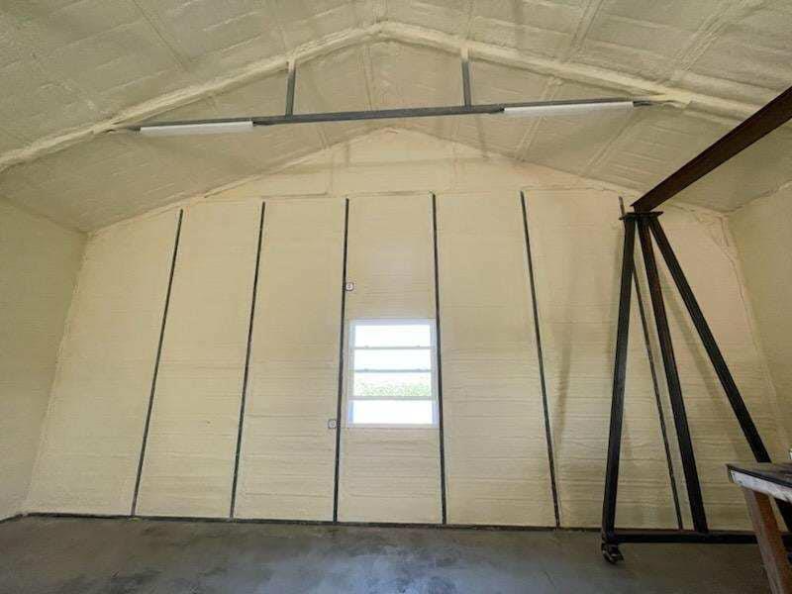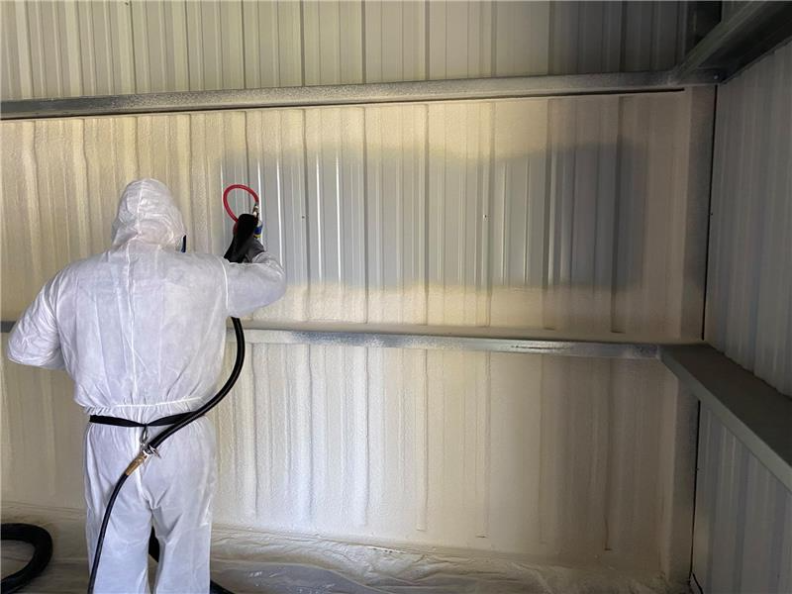
Closed-cell spray foam insulation performs exceptionally well in Bentonville’s humid subtropical climate, offering superior moisture resistance and air sealing capabilities that traditional insulation materials cannot match. Open-cell spray foam and high-quality fiberglass batts with proper vapor barriers also deliver effective thermal performance when installed correctly in this region’s variable weather conditions.
Bentonville,AR experiences hot, humid summers with temperatures reaching 90°F and cold winters dropping to 20°F, creating unique insulation challenges that require materials capable of handling both extreme heat and freezing conditions. The area’s average annual humidity of 65% demands insulation solutions that prevent moisture infiltration while maintaining consistent thermal resistance throughout seasonal temperature swings.
Northwest Arkansas presents distinct seasonal challenges that directly impact insulation effectiveness. Summer humidity levels consistently exceed 70%, while winter temperature fluctuations create freeze-thaw cycles that stress building envelopes. These conditions require insulation materials that maintain structural integrity and thermal performance across extreme temperature ranges.
The region’s clay-heavy soil composition contributes to foundation moisture issues, making basement and crawl space insulation selection critical for long-term building performance. Proper insulation choice prevents condensation problems that lead to mold growth and structural damage in Bentonville’s challenging environment.
| Insulation Type | R-Value per Inch | Moisture Resistance | Air Sealing Capability | Longevity in AR Climate |
|---|---|---|---|---|
| Closed-Cell Spray Foam | R-6.0 – R-7.0 | Excellent | Superior | 30+ years |
| Open-Cell Spray Foam | R-3.5 – R-4.0 | Good | Excellent | 25+ years |
| Fiberglass Batts | R-3.2 – R-3.8 | Poor | Minimal | 15-20 years |
| Blown Cellulose | R-3.6 – R-3.8 | Fair | Good | 20-25 years |
| Rigid Foam Boards | R-4.0 – R-6.5 | Excellent | Moderate | 25+ years |
Bonus Tip: Install continuous vapor barriers when using traditional insulation materials in Bentonville. The region’s humidity requires additional moisture protection that standard kraft-faced batts cannot provide alone.
Closed-cell spray foam creates an impermeable barrier that prevents both air infiltration and moisture penetration, addressing Bentonville’s primary insulation challenges simultaneously. This material expands to fill gaps and cracks that traditional insulation cannot reach, eliminating thermal bridges that reduce overall system efficiency.
Open-cell spray foam offers excellent sound dampening properties while providing effective air sealing at a lower material cost than closed-cell alternatives. Its flexibility accommodates building movement during temperature changes, maintaining seal integrity throughout Arkansas’s variable weather patterns.
| Performance Factor | Closed-Cell Foam | Open-Cell Foam | Traditional Materials |
|---|---|---|---|
| Thermal Resistance | Superior | Good | Variable |
| Moisture Control | Excellent | Good | Poor to Fair |
| Air Leakage Prevention | Outstanding | Excellent | Limited |
| Installation Speed | Fast | Fast | Moderate |
| Long-term Stability | Excellent | Very Good | Fair to Good |
The spray foam application process requires professional installation to achieve optimal performance specifications. Proper surface preparation and environmental conditions during installation directly impact final insulation effectiveness and longevity.

Fiberglass batts remain cost-effective for Bentonville applications when installed with proper air sealing and vapor control measures. High-density batts rated R-15 or higher provide adequate thermal resistance for wall cavities when combined with house wrap and interior vapor barriers.
Blown cellulose insulation offers improved air sealing compared to batts while providing consistent coverage in irregular spaces. This material’s ability to settle around obstacles makes it effective for retrofit applications in older Bentonville homes with unique architectural features.
Bonus Tip: Upgrade to unfaced fiberglass batts and install separate vapor barriers for better moisture control in Arkansas’s humid climate. This approach provides more reliable long-term performance than kraft-faced products.
According to the Arkansas Energy Office, properly insulated homes in Northwest Arkansas reduce energy consumption by 30-40% compared to minimally insulated structures. Spray foam insulation typically achieves the higher end of this range due to superior air sealing properties.
Local utility data from Ozarks Electric Cooperative indicates that homes with comprehensive insulation packages maintain indoor temperatures within 2°F of setpoints during peak summer and winter conditions. This consistency translates to significant comfort improvements and energy savings for Bentonville residents.
The National Association of Home Builders reports that quality insulation systems pay for themselves within 5-8 years through energy savings in Arkansas’s climate zone. This timeframe varies based on insulation type, installation quality, and existing building envelope conditions.
Professional insulation installation ensures optimal performance and longevity in Bentonville’s demanding climate conditions. Ozark Eco Foam provides comprehensive insulation services designed specifically for Northwest Arkansas building requirements.
Attics benefit from R-38 to R-50 insulation levels, while walls perform well with R-15 to R-20, depending on construction type and existing envelope conditions in Arkansas’s climate zone.
Professional installation teams monitor temperature and humidity conditions to ensure proper curing and performance of all insulation materials. Spring and fall months typically provide optimal installation conditions.
Improved envelope tightness often necessitates mechanical ventilation systems to maintain indoor air quality and prevent moisture problems in existing Bentonville homes.
Selecting appropriate insulation for Bentonville requires balancing performance requirements with budget considerations and building-specific factors. Closed-cell spray foam delivers maximum protection against Arkansas’s climate challenges, while open-cell alternatives provide excellent value for many applications.
Professional assessment identifies the most effective insulation strategy for each unique situation. Consider building age, existing envelope conditions, and long-term performance goals when evaluating insulation options for Northwest Arkansas homes.
Transform your home’s comfort and efficiency with professional insulation services tailored to Bentonville’s climate demands. Ozark Eco Foam combines extensive regional experience with proven materials to deliver lasting insulation performance.
Contact Ozark Eco Foam at (417) 572-5893 or ozarkecofoam@gmail.com to schedule a comprehensive insulation assessment. Professional evaluation identifies optimal solutions for your specific building requirements and budget considerations.
Target R-38 to R-50 for attics and R-15 to R-20 for walls in Arkansas climate conditions. Higher values provide better comfort and energy savings, especially in extreme weather periods common to Northwest Arkansas.
High humidity levels reduce thermal resistance and promote moisture accumulation in traditional insulation materials. Spray foam insulations maintain performance by preventing moisture infiltration and maintaining structural integrity.
Professional installation ensures proper air sealing and vapor control critical for Arkansas climate performance. DIY installations often miss thermal bridges and moisture control details that compromise long-term effectiveness.
Upgrade when energy bills increase significantly, comfort problems develop, or during major renovations. Homes over 15 years old in Arkansas typically benefit from insulation improvements due to settling and degradation.
Closed-cell spray foam provides optimal moisture control and thermal performance for Arkansas crawl space conditions. This application prevents ground moisture infiltration while maintaining consistent temperatures year-round.